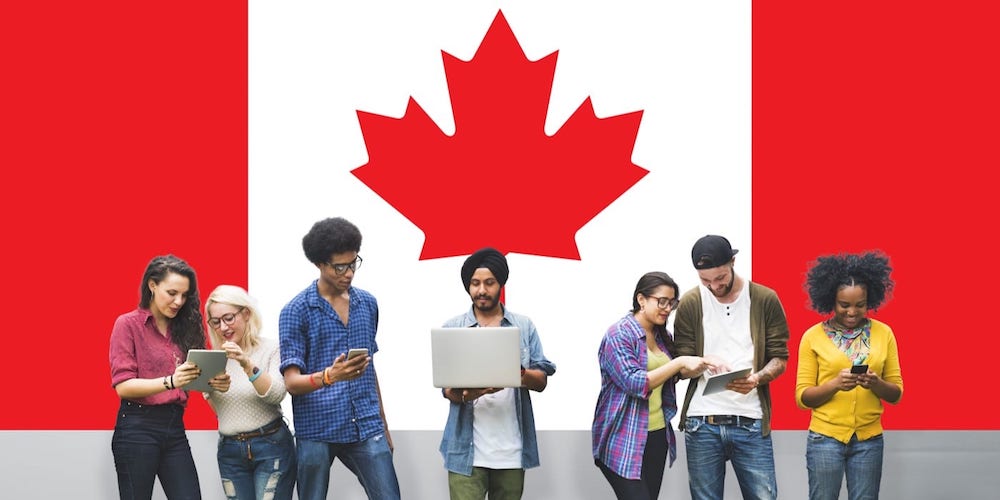Immigration consultants report that recent adjustments to Canada’s student visa policies have led to a significant decline in visa applications from high-achieving students.
Immigration consultants reveal that students with weaker academic records, substantial study gaps, and prior visa refusals now have an unexpected “golden opportunity” to obtain student visas for Canada.
Due to recent modifications in Canada’s student visa policies, visa demand has significantly declined in recent months, particularly among high-achieving students, creating a more favorable opportunity for individuals who have historically encountered challenges in obtaining visas.
The number of students from Punjab applying to Canadian colleges has seen a notable decline, with student visa businesses reporting just 20 percent of the application volume compared to the previous year.
“Last year, if 100 students were heading to Canada, that number has now dropped to just 20,” stated an immigration consultant. This reduction is primarily due to recent changes in Canada’s student visa regulations, which have led students to pause their plans as they await additional updates and consider alternative destinations like the US, UK, and Germany.
Experts suggest that the current situation offers a unique opportunity for students with less competitive academic profiles—such as lower 10+2 exam scores, educational gaps, or poor results in English proficiency tests like IELTS.
Tirath Singh of Pinnacle Immigration, a seasoned consultant in Canadian student visas, noted, “Canada remains accessible to students with significant study gaps or multiple visa refusals. In contrast to the UK or Australia, which frequently reject applicants with gaps after 10+2, Canada is still issuing visas for these cases.”
Singh cited an example of a student who had a five-year gap after 10+2 and initially aimed to study in the UK. “I recommended against it because the UK would likely reject his application due to the gap. However, Canada, with its current visa policies, accepted his application,” he explained.
Other countries, such as Australia and the UK, often reject candidates with extended educational breaks, while the US may still consider them but places significant weight on interview performance. Conversely, Germany is generally more accepting of gaps that occur after graduation rather than those following high school.
Singh remarked, “The visa approval rate for students with study gaps has significantly increased. We’ve encountered instances where students with 10 to 15 years of educational gaps were granted visas, as they were able to account for their time away from studies, whether through involvement in family businesses or other activities.”
Reduced IELTS and PTE scores
Singh also mentioned that his firm had assisted several students with IELTS scores below six or low scores in other proficiency tests, such as the Pearson Test of English (PTE), in obtaining student visas.
“Previously, Canada could afford to be more selective due to the high volume of strong applicants. However, with a reduced applicant pool, students with weaker profiles are now succeeding as long as they can provide a satisfactory explanation for their circumstances. Recent visa approvals include students with IELTS scores ranging between 4.5 and 5 in one of the four modules and PTE scores between 52 and 56, despite the usual benchmarks being 6 and 60, respectively,” he said.
Aman Parmar of Punjab-based V Point Visa Consultants noted that despite numerous restrictions, none of the student visas processed by the consultancy in 2024 were rejected. “He remarked that students with numerous previous refusals were nonetheless able to receive their visas.”
Major adjustments
Starting in January, Canada has not only limited the number of international students but has also implemented several other changes. These include discontinuing the open work permit for spouses of most undergraduate students and requiring provincial attestation letters (PAL) from the province where students are applying for admission.
Additionally, most private colleges and institutions in Canada have been closed to international students under public-private partnership models. Currently, only public colleges and institutions are accepting foreign students.
“Due to these restrictions, the influx of applications, including from high-achieving students, has decreased, leaving thousands of seats vacant in these institutions. This has created more opportunities for individuals who may have been overlooked in the past,” said another consultant.
Previously, many students from Punjab favored private colleges due to the absence of strict requirements such as four to five days of classroom instruction per week, according to another consultant. These students often spent additional time working to save money for their next semester’s fees and to pursue Permanent Residency (PR) after completing their course. However, this option is no longer available, he added.
Looking for a Visa? Apply Today!



